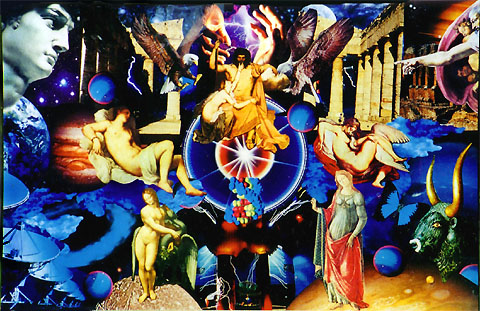What's New
ABOUT PANTHEON & Mythic Living
Find the web version of PANTHEON at the URL below.
What's New with My Subject?
The Story Behind My PANTHEON Site
http://www.zero-point.tripod.com/pantheon/pantheon.html
PANTHEON PREFACE (1999): When I began my own study and practice of pathworking, it became readily apparent to me that there was much more to be learned about godforms in Jungian literature than in all the Qabala and Magick books put together. But no one had been very comprehensive nor systematic about their presentations. Pantheon is a broad survey or study of the archetypes as discussed in the literature of Jungian Psychology. Typically, the Jungians discuss archetypes by using the Greek godforms, since they are generally more familiar from school days and considered more "user-friendly". But pantheons are a cross-cultural phenomena, so a table of correspondences is provided to translate into other cultural pantheons.
This is not neo-paganism. These gods and goddesses are not presented as objects of worship or veneration, but as universal autonomous forces with their own agendas which weave constantly through our outer and inner reality. They are relevant in daily life because they are the motivating factors behind our beliefs, thoughts, feelings, and behavior. We can hardly hope to be self-directing individuals without some knowledge of their patterns and effects on our lives and souls. In this work, the correspondences of godforms to chapters is patterned after the Paths and Tarot Trumps. A godform is corresponded with each Trump through astrological attributes. This makes Pantheon useful to students of Tarot, Qabala, astrology, and Jungian thought.
When I first wrote it in 1983, it was the first and only compilation of this material in one convenient source. Since then, Jungian ideas became mainstream and several analysts and other Transpersonal Psychologists have offered many workshops and written excellent books on "personal mythology." These include such eminent personalities as Joseph Campbell, Jean Houston, Robert Bly, Jean Shinoda Bolin, and Stan Krippner to name just a few. Yet, this volume still has something unique to offer with its workbook format, suggestions for further study, and the qabalistic spin. Myth has become an important core feature of modern spirituality.
Friends Stanley Krippner and David Feinstein have written books called PERSONAL MYTHOLOGY and THE MYTHIC PATH: A 12 week course in Personal Mythology, which I highly recommend. Also excellent is the work of Jean Houston: A MYTHIC LIFE, IN SEARCH OF THE BELOVED, THE POSSIBLE HUMAN. Jungian classics include THE I AND THE NOT-I, FACING THE GODS, and THE NEW POLYTHEISM, and Hillman's Re-VISIONING PSYCHOLOGY.
Many people became interested in the subject after seeing or reading Joseph Campbell's PBS shows or his popular book THE POWER OF MYTH.
Before, during, and after the fad my interest remains and I am still describing these dynamics to myself with new insights into their nature over time. It is not that we worship a god or goddess but that many Gods and Goddesses live through our psychic structure: culturally, religiously, psychologically. David Miller's Jungian 1974 book The New Polytheism has proven prophetic. In the Preface scholar Henry Corbin predicts the rebirth of the gods when he says:
"I believe our researches open the way by necessity, to angelology (that of Proclus, that of the Kabbala) which will be reborn with increasing potency. The Angel is the Face that our God takes for us, and each of us finds his God when he recognizes that Face. The service which we can render others is to help them encounter that Face about which they will be able to say, 'I am able to grasp such as I have seen.'"
